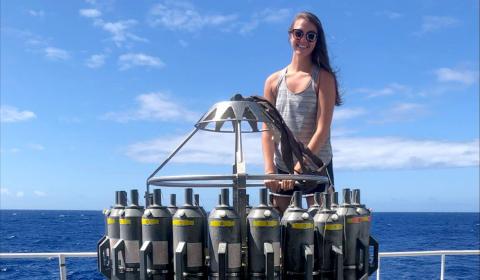
Alumni Spotlight Q & A
Where are you from, Sarah?
I am from St. Paul, Minnesota.
What was your major at UNH and who was your adviser?
I have a Master of Science degree in Oceanography and graduated May of 2021. My adviser was Dr. Robert Letscher with research focused on nutrient biogeochemistry in the Gulf of Maine.
Why did you choose UNH?
When I graduated in 2017 with my Bachelor's degree in Marine and Freshwater Ecology, I did not know what I wanted to do next. After a full year of working in finance and researching ocean-related degrees and careers, I started reaching out to universities across the country who offered "M.S. in Oceanography." When I visited UNH in September 2018 for interviews with prospective mentors, I had a feeling of "this is where I need to be." It is a difficult feeling to describe, but I knew I would be attending UNH starting fall 2019.
What were your favorite courses and which professors had the greatest impact on you?
My favorite course was Rob's ESCI 895 Topics class, "Ocean Biogeochemistry." The topics covered in the course were very interesting and gave me a great foundation for the other courses I would take. Throughout the semester, a student would lead a presentation and discussion on a peer-reviewed article that was applicable to the lecture given a few days prior. This allowed students to discuss topics and assisted with understanding of complex oceanic systems. All of my professors had a great impact on me, but the two with the greatest impact would be my advisor Dr. Rob Letscher and professor Dr. Joel Johnson.
What was student life like and were you involved in any extracurricular activities?
As a graduate student I was very busy with course work, being a TA, research, and friends. COVID-19 hit during my second semester on campus making life on campus more difficult. Besides a few seminars and workshops held by the Graduate School, I wasn't involved in other extracurricular activities, as most available were aimed towards undergraduate students.

What was the biggest transitional issue you faced when you started at UNH?
The biggest transition was the fact I hadn't been in school for two years and was a little bit older than a lot of the members in my cohort. Leaving a full-time job in Minnesota, it was difficult to get back into course work, homework, and not a set 8:00 to 5:00 work schedule.
What is your current position and why is your work important?
I am currently working as an environmental consultant (job title: Staff Scientist/Staff Chemist) at NewFields. NewFields has office locations across the country that each have a specialization. My office is located in Edmonds, Washington, just north of Seattle, and we specialize in sediment management and marine services. Every day is different in environmental consulting. At any point I can have 5+ projects, all with different tasks and timelines, and utilizing various skill sets. What I like best about my position is the constant change – no project is the same. Specifically with my office, being an environmental consultant is important as we are working to reduce impacts of contaminants in marine environments.
What are your future career plans?
I am looking forward to growing my career with NewFields and seeing where environmental consulting takes me!
How did UNH contribute to your career and where you are now?
It is my belief I would not be where I am without UNH. I am very grateful for Dr. Letscher. From taking his courses, to conducting research under his mentorship, to him offering a temporary job post graduation to go out to sea for two weeks aboard the R/V Kilo Moana. I gained experience for the majority of my work responsibilities from UNH. A question from my interview with NewFields was, "Do you have ship experience and being out at sea for longer than a day?" as we have an annual project being out at sea for two weeks. Without the experiences Rob provided me, I may not have the career I have started.
"Grad students – Presenting your work may seem daunting, but it is so rewarding to share the hard work you have put into your research, get feedback and questions you haven't thought about, and get others interested in what you are doing."
Any advice for undergrads/grad students who are conducting research?
For undergrads – Do research you are interested in and you are excited to conduct. As an undergrad, I did the research that was available to me (aquatic toxicology), but it wasn't something I was very passionate about. If you start researching something and find out you don't have that passion or are just going through the motions, it is okay to pivot or talk to another professor!
For grad students – Go to as many conferences as you can! Whether that is just attending and learning what others are doing, or presenting your work. Presenting may seem daunting, but it is so rewarding to share the hard work you have put into your research, get feedback and questions you haven't thought about, and get others interested in what you are doing. There is funding available through different departments to assist you with travel, conference fees, etc.
What impact do you hope your work has on future generations?
I am hoping Gen-Z and generations to follow continue to reduce anthropogenic impacts to the environment and protect our planet.
Are you on social media and do you have any other links to share?
- Yes, you can find me on LinkedIn
- Currently working on a publication with my adviser and committee group members, hoping to submit for review soon!
PURSUE A DEGREE IN OCEANOGRAPY
Are you or is someone you know an alum who conducted research with us? Do YOU want to be featured in an upcoming Alumni Spotlight? We'd love to connect! Please email Rebecca.Irelan@unh.edu with details.